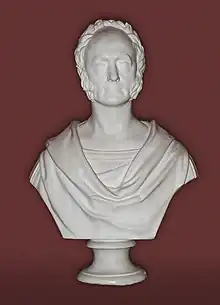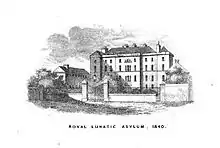Richard Poole (physician)
Richard Poole (1783–1871) was a Scottish physician,[1] psychiatrist, and phrenologist.[2]

Life
Poole was born in Edinburgh, on 27 November 1781, from an English background.[3] His father Matthew Poole (or Pool) owned a coffee house and hotel at 1 Princes Street and lived above.[4]
By 1800 his father is retired and living at Reid's Close on the Canongate in Edinburgh's Old Town.[5]
Poole studied Medicine and graduated M.D. at the University of St Andrews in 1805.[1] He was editor of the New Edinburgh Review, and published articles promoting phrenology in the early 1820s;[6] it existed 1821 to 1823.[7] Poole was also first editor of the Phrenological Journal.[8] Poole joined the editorial staff of the Encyclopædia Edinensis under James Millar.[9]
In 1820 he was living at 23 Broughton Street, a flat in Edinburgh's east end.[10]

From 1820 Poole campaigned for a new infirmary in Edinburgh.[11] In 1825 he was elected a Fellow of the Royal College of Physicians of Edinburgh.[3] In 1829 he was elected a member of the Aesculapian Club.[12] In 1831 Poole was elected a member of the Harveian Society of Edinburgh and served as one of its secretaries from 1834-1837.[13]
In the late 1830s he was a pioneer advocate of mental health reform,[14] and in 1838 he became superintendent of the Montrose Asylum, succeeding W. A. F. Browne. He remained at Montrose until 1845. He then kept a private asylum at Middlefield, Aberdeenshire.[3]
Poole died in Coupar Angus on 18 February 1870 aged 88 at the house of his daughter, Mrs Kirkwood.[3] He is buried with his wife in the churchyard of St. Machar's Cathedral in Aberdeen.
Works
- An Essay on Education (1825).[15] In this work, from the Encyclopædia Edinensis, Poole acknowledges help in early life from Archibald Alison. He advocated education in cases of mental retardation.[16]
- A Letter to Andrew Duncan, Senior, M.D. ... Regarding the Establishment of a New Infirmary (1825).[17] Pamphlet addressed to Andrew Duncan, the elder on the infirmary question; Duncan replied to the agitation for a new infirmary in a letter to William Fettes.[18]
- Report on Examination of Medical Practitioners (1833)
- Memoranda regarding the Royal Lunatic Asylum, Infirmary, and Dispensary, of Montrose (1841)[19]
He is credited with dramas, including "Willie Armstrong" performed in Edinburgh in 1829.[20][21]
Poole also wrote for the Edinburgh Encyclopædia and Encyclopædia Britannica.[3] A list of publications appeared in Scottish Notes and Queries.[22]
Family
An epitaph gives Jane Caird as Poole's wife; it also records his dates as 1781 to 1870.[23] Their children included Samuel Wordsworth Poole, a physician and episcopal clergyman.[24]
Artistic Recognition
A bust of Poole is held at the Royal College of Physicians of Edinburgh. It was donated by his daughter, Mrs Sandeman of Glasgow.[25]
References
- Roger Cooter (1984). The Cultural Meaning of Popular Science: Phrenology and the Organization of Consent in Nineteenth-Century Britain. Cambridge University Press. p. 314 note 66. ISBN 978-0-521-22743-8.
- Roger Cooter (1984). The Cultural Meaning of Popular Science: Phrenology and the Organization of Consent in Nineteenth-Century Britain. Cambridge University Press. p. 42. ISBN 978-0-521-22743-8.
- UM-MEDSEARCH Gateway (1870). The Lancet. J. Onwhyn. pp. 467–8.
- Williamson's Edinburgh Directory 1784
- Edinburgh Post Office Directory 1800
- Hewett Cottrell Watson (1836). Statistics of phrenology: being a sketch of the progress and present state of that science in the British Islands. Longman, Rees, Orme, Brown, Green, and Longman. Paternoster- Row. p. 194.
- James J. Sack (1993). From Jacobite to Conservative: Reaction and Orthodoxy in Britain, C. 1760–1832. Cambridge University Press. p. 19. ISBN 978-0-521-43266-5.
- R. J. Cooter (1976). "Phrenology and British alienists, c. 1825–1845. Part I: Converts to a doctrine". Medical History. 20 (1): 1–21 (5–6). doi:10.1017/s0025727300021761. PMC 1081688. PMID 765647.
- James Millar (1827) Encyclopedia Edinensis; or, Dictionary of arts, sciences, and literature vol. 1, p. vi.
- Edinburgh Post Office Directory 1820
- Charles W. J. Withers (2001). Geography, Science and National Identity: Scotland Since 1520. Cambridge University Press. p. 170. ISBN 978-0-521-64202-6.
- Minute Books of the Aesculapian Club. Library of the Royal College of Physicians of Edinburgh.
- Watson Wemyss, Herbert Lindesay (1933). A Record of the Edinburgh Harveian Society. T&A Constable, Edinburgh.
- M. Barfoot (2009). "The 1815 Act to Regulate Madhouses in Scotland: A reinterpretation". Medical History. 53 (1): 57–76. doi:10.1017/s0025727300003318. PMC 2629162. PMID 19190749.
- Richard Poole (1825). An essay on education, applicable to children in general;. Waugh and Innes.
- Journal of psychological medicine. 1855. p. 587.
- Richard Poole; Andrew Duncan (1825). A Letter to Andrew Duncan, Senior, M.D. ... Regarding the Establishment of a New Infirmary. Archibald Constable.
- The Lancet. Elsevier. 1827. pp. 416–8.
- Richard Poole (1841). Memoranda regarding the Royal Lunatic Asylum, Infirmary, and Dispensary, of Montrose. J. & D. Nichol.
- Ralston Inglis (1868). The Dramatic Writers of Scotland. G.D. Mackellar. pp. 95–.
- Percy Bysshe Shelley (1829). The Edinburgh literary journal: or, Weekly register of criticism and belles lettres. Ballantyne. p. 42.
- John Bulloch, John Alexander Henderson (editors), Scottish Notes and Queries (1888), p. 40; archive.org.
- Alexander Macdonald Munro, Records of Old Aberdeen vol. 2 (1909), p. 248; archive.org.
- David M. Bertie (2000). Scottish Episcopal Clergy, 1689–2000. Continuum International Publishing Group. p. 403. ISBN 978-0-567-08746-1.
- "Art Listing".